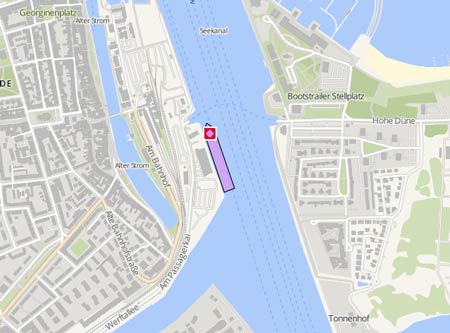EMERALD
Course/Position
Latest ports
Latest Waypoints
Latest news
Sold
Sold to middle-eastern buyers for $5.30m
Kirby to Pay $5 Million for Houston Ship Channel Oil Spill
Kirby Inland Marine has agreed to pay $4.9 Million in civil penalties to settle claims stemming from a 4,000-barrel oil spill in the Houston Ship Channel after one of its oil barges collided with a cargo ship in March 2014, the U.S. Justice Dept. and Coast Guard announced Tuesday. The company has also agreed to implement a fleet-wide improvement program, which includes additional equipment, training, and AIS requirements for every transit throughout its fleet. In its complaint, filed Tuesday in the U.S. District Court for the Southern District of Texas along with the notice of lodging of a consent decree, meaning the settlement was reached with no admission of guilt, the United States alleged that Kirby is liable under the Clean Water Act for the oil spill. The spill occurred on March 22, 2014 when a Kirby tow boat, the Miss Susan, was pushing two 300-foot oil barges in the “Texas City Y” area of the Houston Ship Channel in fog conditions. Despite detecting the nearby presence of a 585-foot bulk cargo ship, the Summer Wind, traveling up the Houston Ship Channel, Kirby’s tow boat and barges tried to cross the channel in front of the cargo ship, resulting in the lead barge being struck by the cargo ship. Approximately 4,000 barrels (168,000 gallons) of heavy marine fuel oil was released from the barge into the waterway. The spill oiled approximately 160 miles of shoreline, including sensitive marsh habitat, the national wildlife refuge on Matagorda Island, Mustang Island State Park and Padre Island National Seashore. https://gcaptain.com/kirby-to-pay-5-million-for-houston-ship-channel-oil-spill/
Report on collision highlights safety issues
Federal investigators on June 9, 2015, released a synopsis of their report on the probable cause of the collision of the "Summer Wind" and the tug "Miss Susan" on Mar 22, 2014, that led to the largest oil spill in Galveston Bay in two decades. The accident spilled 168,000 gallons of thick fuel oil into Galveston Bay. In its executive summary, the National Transportation Safety Board determined that the probable cause of the collision was the attempt of the tug to cross the Houston Ship Channel ahead of the "Summer Wind", thereby impeding the passage of the bulk carrier, which could transit only within the confines of the channel. The report highlighted several safety issues stemming from the March 22, 2014 collision, including the need for separation between vessels in areas like the Ship Channel. The NTSB also found that both federal oversight and company training of personnel exposed to hazardous materials were insufficient.
Upload News

